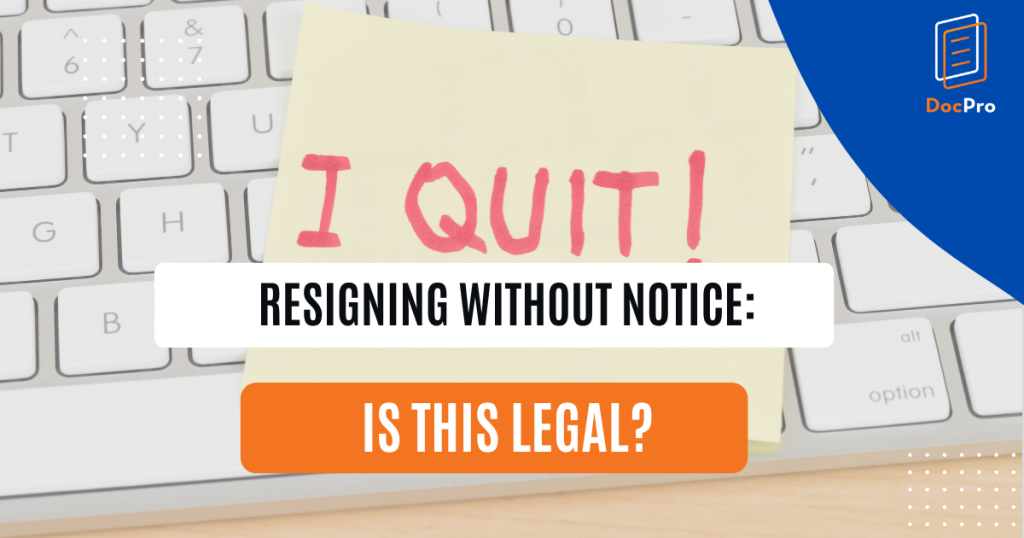Employee Resigning without Notice: Is this Legal?
22 Nov 2024
22 Nov 2024
min read

Can an Employee Quit without Notice? Well, it is not uncommon for employees to resign without notice to the employers. As an employer, you need to understand the legal considerations and steps required to navigate these situations effectively.
This guide covers the following:
- Is it Legal to Quit Without Notice?
- How to handle No Notice Resignation? Next Steps For Employers
- Frequently Asked Questions Answered by Legal Experts
- Download Legal Templates for Employment Agreement
This guide provides a balanced perspective to help employees to manage these challenges and protect their business interests at the same time.
Is it Legal to Quit Without Notice?
Technically, an employee can quit without notice legally i.e. without any legal consequences, unless otherwise stated in the employment contract.
If the employment contract does not require an employee to serve notice period before resignation then such employee is not contractually required to give any notice whatsoever before quitting (not even two week notice!)
According to Ben Michael, Attorney, Michael & Associates, in the cases of at-will employment, which is what the vast majority of people in the US are under, employees can absolutely resign without notice. The notion of giving two weeks’ notice is actually more of a common courtesy than anything else.
In cases where the employment contract provides for a notice period and the employee quits with notice, Alex Freeburg, Managing Attorney and Founder of Freeburg Law, advises the employer that while it's frustrating, enforcing this notice period can be tricky, as it's a contractual matter rather than a legal one. You can certainly try to enforce it through legal channels, but the outcome may not always be in your favor.

How to ascertain whether employee can quit without notice? Steps Employers need to take:
1. Review the Employment Contract for Notice period Clause
Employment Contract includes a notice period clause which generally requires an employee to provide notice period before resigning from the position. This contractually binds the employee to notify the employer in advance before leaving.
According to Jonathan Feniak, General Counsel at LLC Attorney, if the contract provides for a two week notice then the employer may have legal grounds to withhold the final paycheck until that period is fulfilled.
If the contract does not provide for a notice period, then you can request your employer to provide some notice to give you time to hire another person and have arrangements in place for easy transition. However, they are not legally required the serve notice or agree to give notice
2. Assess the nature of Employment: Is the employee a ‘Casual Worker’ or ‘temporary worker’?
It is legal for casual employees to resign without notice, unless required by the employment contract
Casual workers are employed without a guarantee of the number of hours they will be needed. There is no commitment from the employer as to how long they will be needed. Hence, causal workers do not have an obligation to provide notice before leaving due to the nature of their work.
3. Is the Employee on Probation Period?
If yes, then check whether the employment contract allows resigning without notice during the probation period.
A probation period usually lasts for 3 to 6 months, where both the employer and employee can evaluate whether the employee is a good fit for the position.
During Probation, resignation provisions are relatively simpler and less strict. It usually requires at least one week’s notice before the employee’s leaving his or her position. In some places, such as Hong Kong, notice is NOT required within the first month of probation [1].
How to handle No Notice Resignation?
1. If the employment contract requires minimum notice period then deduct pay in lieu of notice:
Can an employer deduct pay for lack of notice from the employee? Check terms for withholding or pay in lieu of notice in the employment contract if te employee has resigned without notice and the employment contract requires a minimum notice period then
In the absence of such provisions, the employer is not entitled to deduct pay for lack of notice from the employee.
2. Commence Off-Boarding Procedures if notice is not required as per the employment contract
It is important to swiftly commence off-boarding procedures like cutting off system access, retrieving company property, processing final pay and document the resignation without notice in the employee file on record, notes Min Hwan Ahn, Attorney and a successful business owner.
Keeping record of all human resources activities in a company is essential. Therefore, as with any other resignations, the employer has to make sure that the employee’s sudden departure is duly recorded and documented. This can serve as helpful evidence as well if the case is brough to litigation in the future.
It is crucial to prevent Confidential Data Theft or Misuse. According to Jonathan Feniak, General Counsel at LLC Attorney, the employer has to make sure any access to business correspondence, databases, and sensitive company information is revoked from the resigned employee. Some employers may miss this crucial step due to the abrupt nature of the employee’s departure, as well as the lack of a transition period. However, to protect one’s company’s interests, it is essential to make sure any business information is secure and well-protected without disclosure to non-company members.
3. Manage Team Morale
An abrupt departure of an employee could stir up unwanted discussions or doubts within the company. Therefore, it is important for the employer to carry out damage control regarding the team’s working morale. Ideally, the employer should clearly explain the situation and any responses from the company towards the resigned employee.
4. Educate your employees about Company policies and expectations
It’s vital to distinguish between what is required by law and what is an employer’s expectation with respect to the notice period for resignation
While employers often expect a formal resignation letter or adherence to the two weeks' notice norm, these are not mandated by law unless explicitly stated in the employee handbook.
Clarifying this distinction helps employees understand their rights and ensures employers maintain realistic expectations.
D. Resignation Policy in Employee Handbook
Employers can avoid ambiguity by documenting their resignation procedures in the employee handbook.
Including guidelines for written notice, acceptable methods of confirmation of notice, and handling verbal resignations ensures clarity for all parties.
For instance, a handbook can outline that a resignation must be submitted in writing to process final payments or unused paid time off (PTO).
Frequently Asked Questions?
- How do you prevent employees from quitting without notice?
Updating your employment agreement is the easiest way to avoid sudden resignation without notice i.e. set out clear notice period requirements in the employment agreements, and any legal or financial consequences to the employee in case of non compliance.
- Is resigning without a notice a breach of contract?
No, unless the employment contract requires the employee to provide advance notice before leaving.
- What are the consequences for an employee resigning without notice when required by the employment contract?
Riley Beam, Managing Attorney at Douglas R. Beam, P.A., explains that if an employee resigns without honoring the notice period, it may result in legal issues. Employers could claim breach of contract, potentially withholding the final paycheck or seeking compensation for incurred costs. However, success requires proving actual financial damages. Employers should first remind the employee of their obligations and decide whether to enforce or waive the notice period. Legal action remains an option but hinges on demonstrating tangible financial losses.

What DocPro Offers
Here at DocPro, we understand your business needs. Therefore, we offer you a range of employment agreement templates with precisely drafted termination clauses which you can use to regulate your relationship with current workers and future recruits. Interested? Visit our website at https://docpro.com/cat35/human-resource-employment/employment-contract-joining-letter-offer-letter for more templates and information on employment contracts.
(DOWNLOAD IN WORD OR PDF) Employment Agreement (Senior Employee) available at:
https://docpro.com/new-document/278/employment-agreement-senior-employee/employee
This template enables the company to establish clear rights and obligations of both parties and ensure that both of them are aware of their obligations. On top of a termination section, it also covers probationary period, discipline, disputes, confidentiality, intellectual property, non-solicitation, rights of third party, etc.
(DOWNLOAD IN WORD OR PDF) Employment Agreement (Junior Employee) available at:
https://docpro.com/doc283/employment-agreement-junior-employee-company
This template, similar to the one for Senior Employee, enables the company to establish clear rights and obligations of both parties and ensure that both of them are aware of their obligations. On top of a termination section, it also covers probationary period, discipline, disputes, confidentiality, intellectual property, non-solicitation, rights of third party, etc.
[1] Hong Kong Labor Department, Chapter 9: Termination of Contract of Employment (https://www.labour.gov.hk/eng/public/wcp/ConciseGuide/09.pdf)
Keywords:
